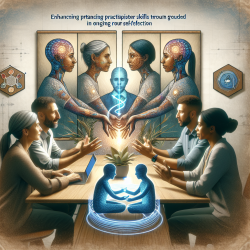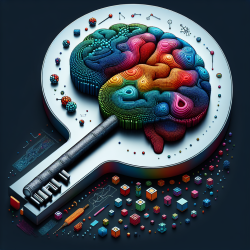Introduction
In the realm of speech-language pathology and other healthcare professions, burnout is an ever-present challenge that can significantly impact the quality of care provided to patients. The research article "Group Self-Reflection to Address Burnout: A Facilitator's Guide" provides valuable insights into how structured group self-reflection can mitigate burnout and enhance professional skills. This blog explores the key findings of the study and offers practical advice for practitioners seeking to improve their skills and well-being.
Understanding the Research
The study conducted by Fleurant et al. (2017) at the Boston University School of Medicine introduced the Clinical Case Discussion Group (CCDG), modeled after the Balint group method. The CCDG is designed to foster self-reflection, empathy, and tolerance of uncertainty among clinicians by exploring the clinician-patient relationship. This approach not only addresses burnout but also enhances interpersonal skills critical for effective patient care.
Key Findings
- More than 75% of clinicians reported improved skills in tolerating uncertainty, increasing empathy, and navigating difficult patient relationships.
- All respondents agreed that participation in the CCDG developed skills in self-reflection.
- The group effectively addressed feelings of isolation and professional stress for over 70% of participants.
Implementing Group Self-Reflection in Practice
For practitioners in speech-language pathology and related fields, implementing a group self-reflection model similar to the CCDG can be a transformative step toward professional development. Here are some steps to consider:
- Form a Group: Assemble a diverse group of practitioners, including speech-language pathologists, social workers, and other allied health professionals, to encourage a broad range of perspectives.
- Facilitate Regular Meetings: Schedule regular sessions where practitioners can present challenging cases and engage in open discussions, focusing on the clinician-patient relationship.
- Encourage Self-Reflection: Promote a culture of self-reflection by asking participants to share their thoughts and feelings about the cases discussed, fostering empathy and understanding.
- Address Professional Stressors: Use the group as a safe space to discuss and address professional stressors, reducing feelings of isolation and burnout.
Encouraging Further Research
While the CCDG model has shown promising results, further research is needed to explore its full potential across different healthcare settings. Practitioners are encouraged to conduct their own studies and share findings with the broader community to continuously refine and improve the approach.
To read the original research paper, please follow this link: Group Self-Reflection to Address Burnout: A Facilitator's Guide.










